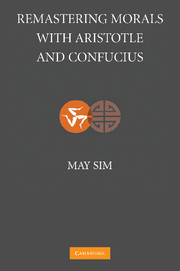Book contents
- Frontmatter
- Contents
- Acknowledgments
- Abbreviations
- Introduction
- 1 Aristotle in the Reconstruction of Confucian Ethics
- 2 Categories and Commensurability in Confucius and Aristotle: A Response to MacIntyre
- 3 Ritual and Realism in Early Chinese Science
- 4 Harmony and the Mean in the Nicomachean Ethics and the Zhongyong
- 5 The Moral Self in Confucius and Aristotle
- 6 Virtue-Oriented Politics: Confucius and Aristotle
- 7 Making Friends with Confucius and Aristotle
- Glossary of Chinese Terms
- Name Index
- Subject Index
Introduction
Published online by Cambridge University Press: 18 July 2009
- Frontmatter
- Contents
- Acknowledgments
- Abbreviations
- Introduction
- 1 Aristotle in the Reconstruction of Confucian Ethics
- 2 Categories and Commensurability in Confucius and Aristotle: A Response to MacIntyre
- 3 Ritual and Realism in Early Chinese Science
- 4 Harmony and the Mean in the Nicomachean Ethics and the Zhongyong
- 5 The Moral Self in Confucius and Aristotle
- 6 Virtue-Oriented Politics: Confucius and Aristotle
- 7 Making Friends with Confucius and Aristotle
- Glossary of Chinese Terms
- Name Index
- Subject Index
Summary
Melodrama is difficult to avoid when discussing the impact of Aristotle upon Western thought and practice and Confucius upon Asian thought and practice. Chinese culture is the single stem from which most East Asian cultures branch, and Master Kong is a taproot of these branches. Western cultures owe much to the Greek and Latin civilizations that styled Aristotle as the “master of those who know.” Each thinker's prescription for life has influenced his traditions for millennia. Even in their rejection of the ancient masters, modern movements in both cultures have been shaped by their rejection, right down to their interpretation of the sciences and society. When I speak of “remastering” in this connection, I mean both to recommend that moral study return to a focus on these masters and that we try to recapture their sense that morality is above all a craft with demands and rewards of the utmost consequence for human life. Moral mastery is what both these estimable masters exact. Without it, we wander in the childhood of morality despite all our clever theories.
My project is a close comparison of the ethics of Aristotle and Confucius, with attention to their views of the cosmos, the self, and human relationships. Dialogue between Asian and European cultures is so important, and Aristotle and Confucius are so pivotal to these cultures, that I hope this study will not be the last. It does, however, seem to be the first monograph-length study of these two figures.
- Type
- Chapter
- Information
- Remastering Morals with Aristotle and Confucius , pp. 1 - 22Publisher: Cambridge University PressPrint publication year: 2007
- 1
- Cited by



